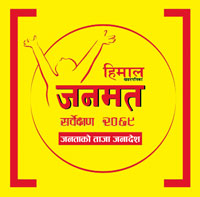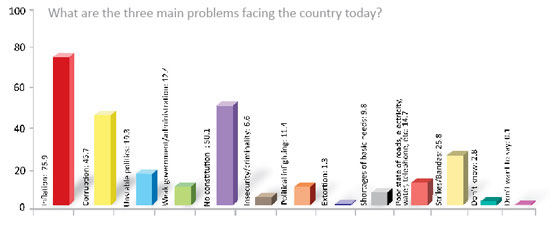 |
Now, we can quantify that. The results of this year's Himalmedia Public Opinion Survey 2012 reinforces many of the conclusions of previous year's polls: on whether or not the constitution will be written by deadline, what to do if it isn't, who is to blame for the delay. The poll also reinforces an enduring message that has come out over and over again in surveys conducted over the past 12 years: Nepalis are too preoccupied with day-to-day survival, are disillusioned with politicians and fed up with politics. Their primary concerns are more mundane: jobs, inflation, corruption, health, education.
Still, Nepalis instinctively know they have to work with what they have, and will back politicians who show integrity, efficiency and a can-do mentality. This is clear from this year's popularity surge of Prime Minister Baburam Bhattarai, with nearly a third of respondents saying they'd vote for him if he stood for elections. The reason is clear: more
than half the respondents think he's done a great job since he became prime minister. His populist photo-ops (riding a Mustang, travelling economy, cleaning the Bagmati) seem to have worked and people seem to want to overlook the fact that he has surrounded himself with crooks. The poll also shows that the higher politicians fly the further they fall: Maoist Chairman Pushpa Kamal Dahal used to top all polls since 2006. This year, his rating has dropped to single digit. The reason must be the media's coverage of his contradictory statements, moving to a luxurious villa, his business interests and his son's shenanigans.
 |
There is nothing wrong with righting historical wrongs, but it does seem that a few politicians want to propel themselves to power by using identity politics even though the silent majority among their own aren't going along. In fact, nearly half the respondents no matter where they live and which ethnic group they belong to, say if you must have federalism, stick with the north-south model to make viable provinces. This is not the Bahun-Chhetri elite in Kathmandu talking, ordinary Nepalis seem to have inherently more common sense than the politicians who represent them.
The good news is that public opinion still matters in this country. It should matter because only then can we quantify public anger and prod political leaders to respond and reform their ways. Prime Minister Bhattarai's popularity is proof that people still value integrity and performance, and will reward it even if it means clutching at straws. And the lesson from the rise and fall of Pushpa Kamal Dahal is to never take anything for granted: especially the people's trust.
Read also:
Voters' voice
The times they are changing, ANURAG ACHARYA


